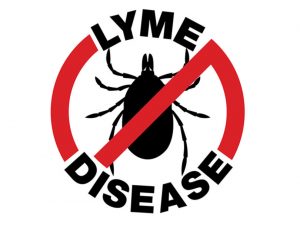May is national Lyme Disease Prevention month. Lyme disease is caused by the corkscrew-shaped bacteria, Borrelia burgdorferi. The bacteria are carried by ticks which transmit the infection when they feed on animals and humans. The disease can cause generalized illness in animals and humans worldwide. The type of ticks that can transmit the bacteria wildlife to humans and domestic animals are the Ixodes ticks. When a tick feeds on a wildlife animal infected with the bacteria, the tick picks up the bacteria and can transmit it to another animal or human the next time they feed. The most common sign of Lyme disease in dogs is arthritis, which causes sudden lameness, pain ands sometimes swelling in one or more joints. Other signs that may be seen include fever, lack of appetite, dehydration, inactivity, and swollen lymph nodes. In severe cases, the infection can cause kidney failure and death although this does not occur commonly in dogs. The signs of heart and nervous system dysfunction seen in infected humans are not often seen in animals. Lyme’s disease is easily treated with antibiotics. The signs of Lyme disease usually regress rapidly in response to treatment. If the disease remains untreated the disease becomes chronic and can cause kidney damage although dogs are much less likely to develop chronic disease than are people.
The best way to protect pets from Lyme disease is to take preventive measures to reduce the chance of contracting the disease.
 People with pets should:
People with pets should:
*Use reliable tick-preventive products. Speak with your veterinarian about what tick preventive product is right for your pet.
*Work with your veterinarian to decide whether to vaccinate your dog against Lyme disease. Your veterinarian’s advice may depend on where you live, your pet’s lifestyle and overall health, and other factors.
*When possible, avoid areas where ticks might be found. These include tall grasses, marshes and wooded areas.
*Check for ticks on both yourself and your animals once indoors.
*Clear shrubbery next to homes.
*Keep lawns well maintained.
